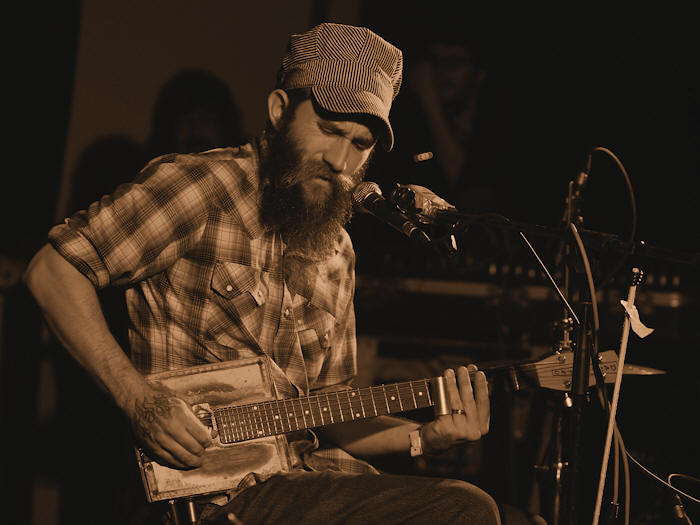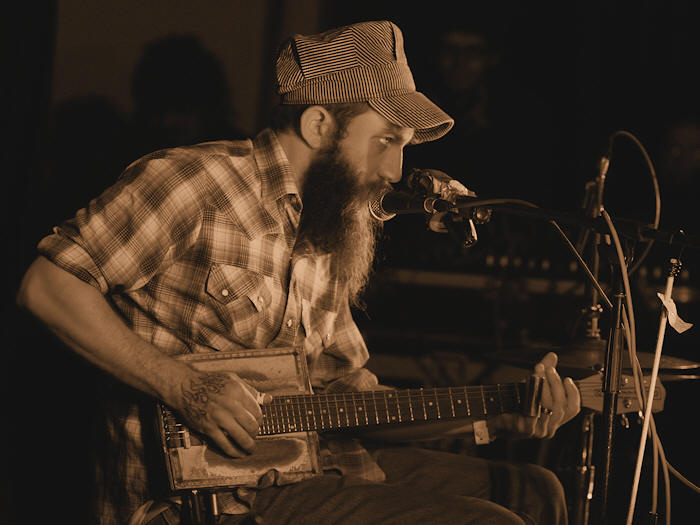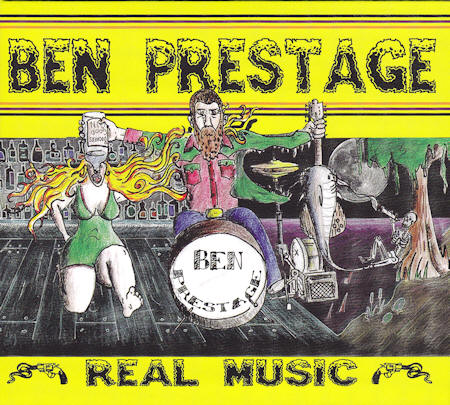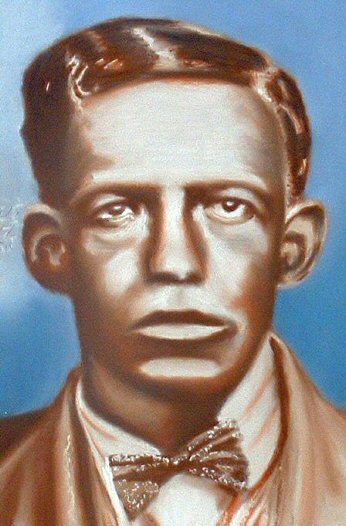
Painting © 2004 Loz
Arkle
Website
© Copyright 2000-2011 Alan White - All
Rights Reserved
Site optimised for Microsoft Internet Explorer
Early Blues Interview
|
|
"Guitarist/singer/songwriter, one-man-band, runner-up in the 2008 International Blues Challenge and recipient of the Most Unique Performer award at The Songwriters' Showcase of America. Born the grandson of a Mississippi sharecropper and great grandson of a vaudeville musician who toured with Al Jolson, Ben Prestage has been soaked in Blues tradition and Mississippi culture since birth. Growing up in the swamps of south central Florida, he began to mix Mississippi Country Blues with his own brand of Florida Swamp Blues. This Muddy-Waters-meets-back-water stew has led him to perform throughout America, at festivals, every kind of bar, and sometimes on downtown sidewalks.
Ben spent some time as a street
performer on historic Beale Street in Memphis, where he shared a spot in
front of the New Daisy Theatre with modern blues legends Robert Belfour
and Richard Johnston. Being a street musician in the Blues Ďcapitalí of
the South threw Prestageís music in a new direction. He added a cigarbox
guitar, giving him the facility to play bass and guitar strings
independently. Then he added a series of foot pedals that can be
manipulated by the heels and toes of both feet to play a drum kit". I caught up with Ben at the Carlisle Blues Festival during his very successful first tour in the UK with Ian Siegal. Alan: Thanks for your time Ben. What were your first musical memories growing up in Florida? Ben: Probably listening to Blues. My Dad was from Mississippi and he listened to a lot of old blues music. When I was 10 years old I started playing the trumpet in school so learnt the basics and then when I was about 12 or 13 I started playing guitar that my Dad had around the house. I learnt a couple of chords and started trying to play blues stuff that I liked and listened to and that my Dad liked and listened to; the blues from Mississippi. I started playing so he said, ďWow man, if you like that, you listen to this, listen to Little Walter, and if you like this guy listen to that.Ē I remember that one of the guys I was listening to was playing the boogie beat on guitars and I was trying to learn that little base line, that little rhythm, and one day when I was fooling around it with a bunch of family was there, including my Grandma. She plays piano and she said, ďWhatís that youíre playingĒ, so I said, ďItís bluesĒ and she said ďThat sounds like the boogie-woogie that we liked when we were youngerĒ and she went over to this old piano we had that nobody played and she just started ripping off some really cool boogie-woogie stuff. She was in her Ď70s at the time. Thatís my first memory of it and it really hit me hard. Alan: And I believe your Great Grandmother was in vaudeville? Ben: Yes, she was a professional musician and she toured with vaudeville around the early 1920s. Thereís always something special about a vaudeville and their special thing was that they had an all-girls orchestra. I actually have a business card of theirs that my Grandmother gave me when she found out I was playing professionally. There was 5 of them and the card looks like a postcard and has their picture on and says, ďGirls Orchestra Ė we specialise in dance musicĒ. They also toured as the Navaho girls and dressed up in Native American clothing and headdresses. Alan: You are the grandson of a Mississippi sharecropper so obviously the blues tradition has always been there but you were born in Florida and perhaps brought up with the Swamp Blues. How do you reconcile mixing the two? Ben: I like all kinds of blues music. My grandfather who was a sharecropper was my Dadís Dad and it was on my motherís side that there was the boogie-woogie, so I had two lines. I like all kinds of blues, all of it. Music is music really Ė thereís only 12 notes in western music so as long as the soul and the feeling are there I like it all.
Ben: I did when I was younger but I didnít think it was attainable and I always had people telling me that I couldnít or I shouldnít and I should have a back-up plan. When I was growing up and going through school I always kept it in the back of my mind to have a back-up plan so I went to college for a music and got a scholarship for music and was still planning on being either a teacher or going into construction but it wasnít until I was going to school part-time, working almost full-time and playing music every night of the week that I knew I had to make a choice. One time I had nine 4 hour gigs in a week, two on Saturday, two on Sunday and every night in between, as well as work and school. I was about 20 or 21 at that time. What Iíd always wanted to do was music and I was making more money from music than I would have done with my job or if Iíd gone through school and paid off loans. So I just knew I had to go for it and I did. Alan: So what does the Blues mean to you? Ben: Itís my life now. Itís taken me half way across the world. It came from a dark place but to me it was always a way to get out of that dark place and celebrate life. The good and the bad. Alan: When you were in Memphis you became a street musician, busking on Beale Street. Tell me about those times. You met a lot of people obviously. Ben: I played there with John Lowe, the guy who makes my cigar box guitars and Richard Johnston, Robert Balfour and with some other local musicians around Memphis who just played on the street there. It was really good when it was warm out and there were a lot of people from all over the world that go there and get to hear you so that was a good thing. But itís kind of a rough town when you get outside the downtown tourist area but thereís some great music there. We used to live near Wild Billís, the juke joint there and weíd go and listen to music and I learnt a lot about music and about life by doing that. Alan: You mentioned John Lowe, inventor of the 'Lowebow', a type of diddley bow. Whatís so special about it? Ben: He started making them as a real diddley-bow, just a one-stringed instrument and he basically had a broom handle with one string on there and he made his own electronic pick-up for it to amplify it. It kind of grew from there and he went on to a two string diddley-bow, then a three string and then he came up with the idea to do stereo pick-ups and to put a bass string and a couple of guitar strings together and run them through separate amps. Thatís when the Lowebow birthed, that's when it really came about,from becoming a diddley-bow to a Lowebow and then he added a cigar box basically to shield the pick-ups. Thereís metal tape inside so you donít get a hum or a buzz when youíre playing in larger venues. Itís a whole different sound and it opens up a whole new part of your mind when youíre playing music.
Alan: Unique. Ben: Yes, definitely. Alan: It was great to see it today. Now to attract crowds on the streets I believe that you also added a pedal drum kit. How does that work? Ben: Yes, thatís what I was playing tonight. I started just playing guitar and singing and then me and John Lowe had the Lowebow but thereís so much music on Beale Street that itís hard to get people over to where you are. I always stomp my foot when I play and I eventually just added some kick drum and a high hat and from there I added a snare drum and the way I do that is by using bass drum pedals, one for the bass and one for the snare drum and I turn the snare drum up vertically and play it like a mini-kick drum. For the high hat pedal, you already have the pedal there so from there itís just grown. I have a double-bass drum pedal for my snare drum now so I can get rolls and different beats with that, and I added a tom with another kick drum pedal and I can rock my feet back and forth to the left and right to hit different pedals and I can go from my heel to my toe and hit different pedals. Alan: Again, thatís unique! Again in Memphis you had great success with the Blues Foundation Blues Challenge coming 4th, 3rd and 2nd in consecutive years. Tell me about that experience. Ben: That was really good! I think itís good for a lot of people. The main thing about it for me was that it was a great networking thing and I got to meet musicians from all over the world. Last time I was there every continent was represented except Antarctica, there were blues bands from Taiwan, Australia, New Zealand, all over Europe, America, Canada and itís a great experience to meet these people who are only there because of the love of blues. And then you meet fans from all over the world, and festival promoters and club owners and thatís what itís really about. Itís not really about trying to win, itís just about going there and everybodyís energy there is big. Alan: Whoís influence you most in your music writing and playing? Ben: Ah man, thereís so many! I canít really name one. I really like the old stuff, the old guys from Mississippi like Freddie McDowell, Booker White but anybody I hear has an effect. Iím on this tour now with Ian Siegal and Iím sure that when Iím done with it heíll definitely have influenced me! Itís a huge list, too many to mention. Alan: You play acoustic and electric guitar, diddley-bow, foot drums, harmonica, lap steel guitar, fiddle, everything. Whatís your favourite instrument? Ben: It depends what song Iím playing really and what kind of mood Iím in. I do all that and then lately Iíve been getting into banjo and fiddle and Iíve been doing some old time stuff on that. Yes, it really depends on my mood. Alan: Are there any songs you play that have special meaning to you? Ben: I wrote a song called Weedhead that has special meaning but I donít know if I should get into that! Alan: Okay! Your music is performed in a one-man-band context. Have you come across UK based one-man-bands, such as Ray Stubbs from Gateshead? Ben: Yes, I know of him. Alan: Mike Wellans from Scotland? Ben: No, I donít know him. Last time I was in the UK I met Dollar Bill at the Secret Garden Party just outside London and heís really good. He was the main one that I met and talked to a little from the UK. Alan: I guess this is an inevitable question....people will be comparing you with Seasick Steve whoís had great exposure in the UK. Have you met him? Ben: No, Iíve never met him. I heard of him the first time when I was living in Memphis and there was a fellow named Dennis Brooks who helped me a lot. He was a genius of Memphis history and lore, he was born and raised there and he knew every musician who ever passed through there and they all knew him. He was just a great dude and he took me round and introduced me to Sherman Robertson who was the guy who gave Seasick Steve a 3 string guitar. I saw a video on You Tube about him telling that story. I knew he was doing some stuff in the States but I didnít know how well he was doing over here until I came over here. Itís good to hear that heís doing good because heís a great musician, really good.
Alan: Youíve released five self-produced albums in the US and now youíve got another one out, Real Music, through the Nugene label. Tell me about the making of that. Ben: I recorded it in Florida with a friend of mine who is actually a teacher at Florida State University which is one of the biggest recording arts schools in America. A lot of professional people come there to record and a lot of students go on to become real high end sound engineers. He teaches sound recording there and Iíve been friends with him for a long time so he was able to get me some real quality studio time for a good price and he really knows what heís doing so we get together in there and make an album. I tried to do a mix of songs from Mississippi blues, ragtime guitar, cigar box guitar and the Lowebow, the harmonica and I even had a friend of mine play some tuba base lines New Orleans-style so itís a real good mix of blues stuff on that CD. Alan: So how do you see the future of blues music? Ben: Phew, man, itís kind of hard to say really. I think with every generation it waxes and wanes and itís kind of like the folk revival in the 60s brought a lot of that stuff back there's a lot of people doing the rock blues stuff and I think it will always be around as long as there's rock n'roll. But as far as real blues, hard-core, down-home stuff, well, I donít think itíll ever die because itís the basis of everything thatís out there now and itís neat to see in the States that thereís younger people who donít really know that itís blues. Iíve done shows and festivals with rock bands, heavy metal bands, hip-hop bands and I can go there in the one-man band format with the Lowebow or some of that fast finger picking stuff and I can draw those people in that donít even know itís blues. I try not to tell them until they buy the CD or that they admit that they like it and then theyíre okay and I say, ďWell if you like this song then check out Booker White or if you like this one then go the route of Tom Waites and slowly work your way back.Ē But I think all people would like blues if they heard the right artist and they just get turned off by the stereotypes that blues has. Alan: So what are your future plans? Youíve got the rest of the tour with Ian Siegal and then are you back to the States? Ben: Yes, Iím back to the States. Iím pretty much booked up now I think until February or March. I have some days open in April and then in June Iím back in Europe, booked in Holland. Maybe I'll come back to the UK middle to end of June. Iíve recorded 11 tracks now for my latest CD and I want it to be 12 or 13 tracks which I want to be mostly originals in the same style. I think Real Music with Nugene Records was my best CD up to this point but I think this new one is going to be even better. Alan: When's it coming out? Ben: Iím planning on releasing this by January/February in the US. Iíll release it in the US and then Nugene has the option to pick it up for further distribution. In the US I do everything myself but when I met Richard at Nugene he impressed me as a good dude and he does what he says he's gonna do. That's hard to find in the US in this genre.
Alan: Ben, thank you very much indeed for your time.
Ben
Prestage's first UK release 'Real Music', recorded in his home state of
Florida, Check out photos of Ben at the Carlisle Blues Festival
Return to
Blues Interviews List |








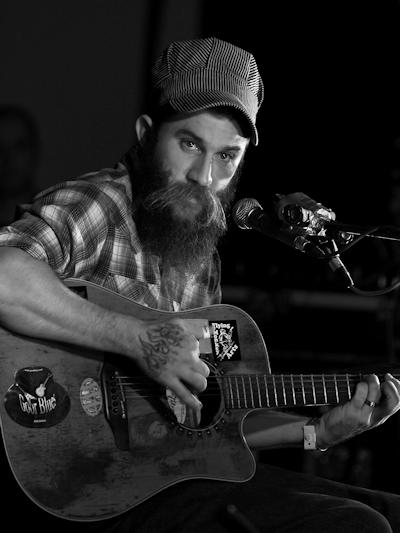
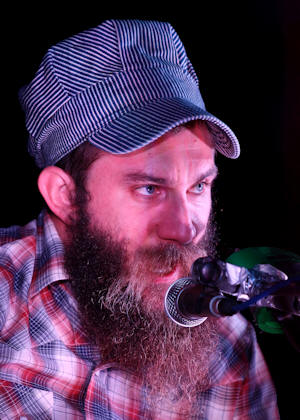 Alan:
Did you always want to become a musician?
Alan:
Did you always want to become a musician?